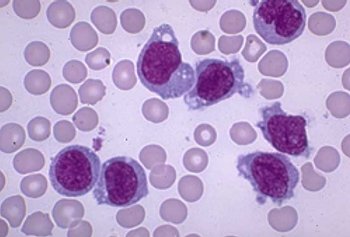
Samantha DiGrande
Articles by Samantha DiGrande



Announced today, Bristol-Myers Squibb’s nivolumab (Opdivo) has received FDA approval as the first immuno-oncology treatment for patients with metastatic small-cell lung cancer (SCLC) whose cancer has progressed after platinum-based chemotherapy and at least 1 other line of treatment.

A recent study found that the poly (ADP-ribose) polymerase (PARP) inhibitor talazoparib extended progression-free survival (PFS) and improved quality of life over chemotherapies for patients with metastatic human epidermal growth factor 2-negative breast cancer and mutations in the BRCA 1/2 genes.

For insights on this issue, Evidence-Based Oncology™ spoke with Lynda Kwon Beaupin, MD, a pediatric hematologist-oncologist who recently became the director of CanSurvive, the pediatric cancer survivorship program at Johns Hopkins All Children’s Hospital in St. Petersburg, Florida. Beaupin and her colleagues in the Consortium of Adolescent and Young Adult Cancer Centers, which includes oncologists from major cancer centers including Johns Hopkins, are working to address the nuances that come with treating adolescent and young adult cancer patients and looking for ways to increase their quality of life.

In a study published in JAMA Oncology, researchers found that a majority of patients eligible for immune checkpoint inhibitors started to receive the treatment within a few months of the drugs approval.

Researchers recently evaluated data collected from a lung cancer screening program at the University of Illinois at Chicago (UIC) and compared results to the national lung cancer screening guidelines.

Researchers from the University of Texas MD Anderson Cancer Center, along with the Pediatric Acute Lung Injury and Sepsis Investigators Network (PALISI), recently published guidelines in Nature Reviews Clinical Oncology for the management of chimeric antigen receptor (CAR) T-cell therapy for children with acute lymphoblastic leukemia.

A blood-based test to assess tumor mutational burden (TMB) was recently discovered as being able to accurately identify patients with non–small cell lung cancer (NSCLC) who could benefit from checkpoint inhibitor treatment. The study, conducted by researchers at UC Davis, Genentech, and Foundation Medicine, was published in Nature Medicine.

Celyad, a biopharmaceutical company that focuses on the development of chimeric antigen receptor (CAR) T-cell therapies, recently announced that the FDA has accepted its Investigational New Drug (IND) application for CYAD-101, the first non–gene-edited allogeneic clinical program.

Bristol-Myers Squibb recently announced that the European Commission has approved nivolumab (Opdivo) for the adjuvant treatment of adult patients with melanoma that have lymph node involvement or metastatic disease and who have undergone complete resection.

The Dana-Farber Cancer Institute recently announced that it is partnering with Royal Philips in order to establish and provide improved clinical pathways in cancer care.

In a recent study, researchers looked to determine whether a symptom and psychosocial collaborative care intervention would improve heart failure–specific health status, depression, and symptom burden in patients with heart failure.

A new study published in Nature Biotechnology found that by attaching a kind of cytokine “backpack” to T-cells through the use of a nanoparticle gel enhanced their efficacy in treating tumors in mice.

AJMC®TV interviews let you catch up on what’s new and important about changes in healthcare, with insights from key decision makers—from the clinician, to the health plan leader, to the regulator. When every minute in your day matters, AJMC®TV interviews keep you informed. Access the video clips at ajmc.com/interviews.


KEYNOTE-048, a phase 3 trial studying pembrolizumab (Keytruda) as a first-line treatment for patients with recurrent or metastatic head and neck squamous cell carcinoma (HNSCC) whose tumors overexpress PD-L1, has met a primary end point of overall survival.

A recent systematic review and meta-analysis published in The Lancet Oncology found that men with advanced cancers respond better than women to treatment with anti-PD-1 or anti-CTLA-4 immune checkpoint inhibitors.

A recent study published in Radiology found that evaluating the differences in iron accumulation in the deep gray matter of the brain using a magnetic resonance imaging (MRI) technique may help to identify patients with multiple sclerosis (MS) that are at greater risk for disease progression and disability.

A recent study published in the European Journal of Clinical Nutrition found that healthcare professionals are downplaying the importance of patients with multiple sclerosis (MS) following national dietary guidelines.

Genentech announced yesterday that the FDA has granted Breakthrough Therapy Designation to atezolizumab (Tecentriq) in combination with bevacizumab (Avastin) as a first-line treatment for patients with the most common form of liver cancer, advanced or metastatic hepatocellular carcinoma (HCC).

Here are 5 of Supreme Court nominee Judge Brett Kavanaugh’s opinions on heavily debated healthcare topics.

Yesterday, drug manufacturer Bristol-Myers Squibb announced that the FDA has approved the combination nivolumab (Opdivo) plus low-dose ipilimumab (Yervoy) for the treatment of adult and pediatric patients aged 12 years and older with microsatellite instability high (MSI-H) or mismatch repair deficient (dMMR) metastatic colorectal cancer (mCRC) that has progressed following a fluoropyrimidine, oxaliplatin, or irinotecan-based chemotherapy treatment.

The FDA has granted priority review for Keytruda (pembrolizumab) as a treatment for previously treated patients with advanced hepatocellular carcinoma (HCC).

Drug manufacturer AbbVie, and a nonprofit drug discovery division of Scripps Research, Calibr, announced earlier this week that they are partnering to develop chimeric antigen receptor (CAR-T) cell therapies primarily aimed at treating cancer, particularly, solid tumors.

This week, drug maker Roche released positive data from its phase 3 IMpower133 study that investigated an immunotherapy-based combination of atezolizumab (Tecentriq) and chemotherapy in the treatment of extensive-stage small cell lung cancer (ES-SCLC).

In a recent study presented at the European Academy of Neurology Annual Meeting held in Lisbon, Portugal, from June 16 to 19, researchers found that the levels of neurofilament light chain (NfL) can be a reliable predictor of disease worsening in relapsing-remitting multiple sclerosis (RRMS) patients.

In a statement released yesterday, the FDA has announced that it is restricting the use of pembrolizumab (Keytruda) and atezolizumab (Tecentriq) for patients with locally advanced or metastatic urothelial cancer who are not eligible for cisplatin-containing therapy.

Last week, Bristol-Myers Squibb announced that the China National Drug Administration approved the country’s first immuno-oncology and first PD-1 therapy, nivolumab (Opdivo), for the treatment of locally advanced or metastatic non-small cell lung cancer (NSCLC).

Last month, a retrospective observational study was published in PLOS One that investigated the safety and efficacy of rituximab in patients with progressive MS (PMS) and relapsing-remitting MS (RRMS) in a single tertiary care center in Switzerland.



